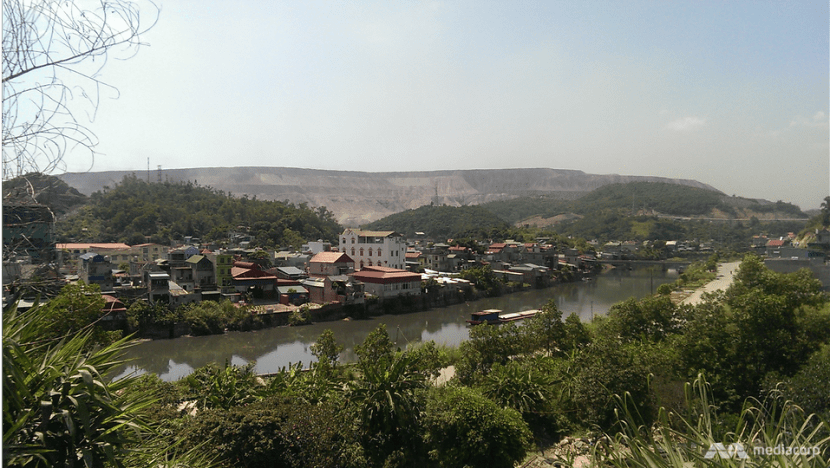Vietnam seeks to shift reliance on coal as climate change impacts its coastal homes
Although the country produces less than 1 per cent of global greenhouse gases, it is looking at ways to reduce its emissions to mitigate environmental impact.

The mountain of coal waste defines Mong Duong's landscape. (Photo: Tan Qiuyi)
HANOI: A church in northern Vietnam that was once the heart of a thriving fishing community now stands partially submerged by rising sea water.
The concrete embankments built by the villagers to preserve remnants of the village’s past mean that the walls of the church remain intact. However, the villagers themselves were forced to relocate to a new village further inland, 1km away.
The loss of the village is just one of the effects of climate change in Vietnam, which is one of the most vulnerable countries to such environmental impact. Although the country produces less than 1 per cent of global greenhouse gases, it is looking at ways to reduce its emissions to mitigate environmental impact.
To move the needle towards net-zero carbon emissions by 2050, as it pledged to do so last year at climate talks in Glasgow, Vietnam's energy-intensive industries will need to shift away from coal, towards cleaner power sources.
CHALLENGES IN CUTTING EMISSIONS
More than 70 per cent of the country's emissions come from the power sector, but weaning off coal is proving to be a challenge for the country despite its efforts.
Among the country’s efforts is the launch of the Trung Nam power project, which was commissioned in June 2019. The 450-megawatt solar farm in central Ninh Thuan province is one of many that have sprouted up in recent years, as the government dished out generous incentives for green initiatives.
While it is one of Southeast Asia's biggest solar farms, it has not lived up to its potential - as much as 40 per cent of its capacity goes to waste due to the lack of a pricing mechanism to sell the energy.
Mr Nguyen Tam Tien, chief executive of Trung Nam Group which manages the project, said that the challenge for private enterprises in the renewable energy sector is the lack of specific regulations for the private sector to grow in this field.
"For example, there is no feed-in-tariff or price for electricity from renewables, no full utilisation of renewable energy," he said.
Infrastructural constraints, like the limited capacity of the national grid, are further hurdles to making the switch.
“The grid was a bit outdated to manage such a big influx of distributed energy. So I think the concern to resolve now is more on that," said Mr Matthieu Francois, a partner at McKinsey & Company.
FINANCING DEAL IS POSSIBLE SOLUTION
Vietnam’s Minister of Industry and Trade Nguyen Hong Dien earlier this year acknowledged that Vietnam is facing great challenges to realise its commitments at COP26.
"Vietnam has to both expand its power grid and generation while transitioning to cleaner energy sources. At the same time, we need to keep electricity prices affordable," he said.
Solar and wind power currently account for as little as 4 per cent of the country's energy usage, but Vietnam is looking at ways to increase this. It is seeking funding of up to US$14 billion a year through 2030 to develop new power plants and expand its grid.
But the current gridlock has raised questions as to whether there is sufficient political will to push through changes and open up the tightly controlled energy market.
It remains to be seen if a financing deal for Vietnam can be sealed at the ongoing climate talks in Egypt. Such a deal is expected to be crucial to cutting emissions.
Vietnam’s energy transition, or lack thereof, could have an impact on its businesses, given that Vietnam drives a lot of its economic growth from its exports, Mr Francois noted. There may be pressure on export-heavy countries like Vietnam to be more respectful of the net-zero commitment, especially in the industries that it is competitive in, he said.
"There are also risks that, if we (Vietnam) don't transition, the financing will dry out or some global markets would close … to Vietnam," he said.
Besides businesses, lower emissions could also play a role in the fate of villagers living near the sea, who fear losing their homes if the sea level continues to rise due to climate change.

















